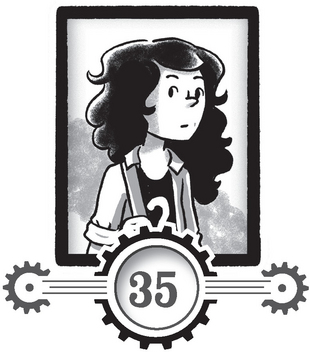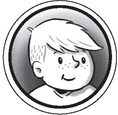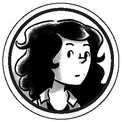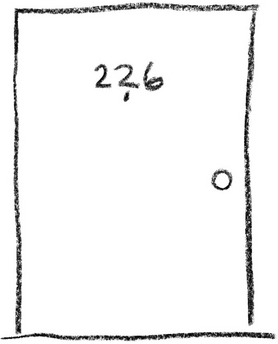

Completely, snow-white blizzard blank.
The last panel, the preceding page and, yes—as Addy flipped through with trembling fingers—the entire comic book was now as empty as a new journal, waiting for someone’s heart’s desire to be scribbled across the paper.
“What happened?” Wylder sounded as though he might be choking. “Are we dead?”
Addy was too aware of too many parts of her body to be dead. Her hair was a tangled mass of snakes; her stomach was grumbling with fear and hunger; and she smelled like a giant ashtray.
“I’m not dead and neither are you. But …”
Uncle Vim lay at their feet. Seconds ago, the ground beneath him had been the battered cobblestones of a busy street. It was now as white and smooth as a fresh bedsheet. The roar of the crowd, the workmen’s hammering, the crash of thunder, the clanking of the cart carrying Flynn to his doom, the cries and the crackle of fire—all had stopped. All sound had stopped.
There was nothing to see. Except each other, adrift in a sea of white fog. Not going anywhere. But not on firm ground either.
Addy had her bag, and her jeans were still tied around her waist. Wylder was wearing his backpack. The onion rings were somewhere inside Catnip.
Addy kneeled—on what, she wasn’t sure, but the whiteness was firm where it needed to be—and laid her head on her uncle’s chest, feeling the slight, miraculous rise and fall.
“Is he alive?”
She smiled and teared up and nodded at the same time. Catnip crept from her shoulder onto the unconscious man, where he sniffed and quivered his tail before curling himself into the nook under Vim’s ear.
Addy gazed down at the funny face she loved so much. His eyes were closed, but he still managed to express surprise. Something about the eyebrows. The left lens of his glasses had popped out of the frame, and who knew where in this fog it had landed?
“Uncle Vim?” she said. “Can you hear me?”
“Chirp!” said Catnip, a whisker away from Vim’s ear.
Uncle Vim’s eyelids fluttered and stilled. And fluttered again.

There were faint but clear noises—screeches, crashes, shouts, a deep bell. The fog began to burn away, revealing blasts of color and motion.
“Oh!” cried Addy. Vim’s brain was working!
“It’s coming back!” said Wylder. “Smell that smoke!” He stomped his feet. They made a ringing sound on stone. “The world is here.”
Uncle Vim’s lips moved, but Addy could not make out what he was saying. She leaned in close.
“What do you mean, real?” she said.
Viminy fumbled at the pocket of his sweater. His eyes closed. The scene around them began to fade. The sounds softened and ceased.
Uncle Vim began to snore.
The world was white again.

“Amazing!” said Wylder. “It all went blank when he got clonked. But then he woke up, and his ideas came back to life.”
“Sort of the way he starts every time,” said Addy. “With a blank page. The story comes out of his head, through his pencil and ends up in here.” She tapped the singed comic in her hand.
“So him drawing makes it real, huh?”
“Not exactly. Apart from today, which was a little too real. I think it’s the other way around. Usually, when Vim is sketching, it’s as if he already knows the place. It already exists. And he’s inviting you into his world.”
Wylder remembered the way he’d felt, wandering around ComicFest. All those writers and artists and fans, all the fun and possibilities.
Addy stared out at the sea of whiteness.
“But he didn’t draw this,” she said, lifting the corner of a page and peeking in.
“Wait! What are you doing?” Wylder braced himself for the tumble action.
Addy thumbed the edges, showing one blank page after another. But nothing happened.
“All day we were sort of drawing the comic along with him,” said Addy. “Re-drawing.”
“Changing stuff,” said Wylder. “But even when we messed up the plot, we were opening doors for the characters, somehow letting them think for themselves.”
“Like Isadora having the idea to give Flynn a new hand. Or Nevins dumping the onion rings.”
“The catalyzer making Catnip bionic—though I guess that wasn’t his idea.”
Addy ran a finger down Catnip’s back. His whiskers quivered as he slept. Life was easier when you were a rat.
“It’s cool how the real world sort of overlapped with the comic,” said Wylder. “Like when Nelly came to Toronto, she had the idea to steal some guy’s wallet.”
“What!?”
“Don’t worry—I gave it back. But it’s the same thing, right? Her deciding to have fun?”
“What if every time you opened a book you actually went into a different world?” Addy looked down at the battered comic in her hand.
“However we got here,” said Wylder. “You have to admit that lots of today was awesome fun.”
Addy flashed a rare smile. “It was,” she said. “Part of it. I sure didn’t expect to be talking to you a whole day after I met you. Or even a whole minute. That’s a big fat surprise.”
“Let alone helping each other. Being a team together.” Wylder’s cheeks went warm.
“But now, seriously.” She waved her hand at the blank world. “We have to get out of here.”
“Too bad your uncle can’t just draw a happy ending.”
Addy gave Wylder a sharp look that used to—only this morning—make him uncomfortable. It still did, a bit.
“You’re right,” she said, surprising him.
“I am?”
“He can’t though,” she said. “So it’s up to us.” She stood and began to pace. “I’m going to think on my feet for a minute.”
Addy didn’t hop like her uncle did, but Wylder could see this was her version, the marching thing. He held his tongue and let his mind whirl.
What if they were stuck here in foggy nowhereland forever? Maybe not as bad as Toronto under Mayor Lickpenny, but pretty soon he’d get hungry, and there was nothing to eat. He’d have to go to the bathroom, and then what? There was no flush factory.
Wylder shook his head. This was not how great discoveries were made. Isaac Newton and Alexander Graham Bell thought about gravity and telephones—not about having to go to the bathroom.
Addy stopped pacing. “Are you thinking the same thing I am?”
The colored flecks in her eyes kind of sparkled.
“Lightbulb?” he said. “You have your ‘I’m going to make this happen’ look.”
“What we were saying, about drawing.” She poked around in her shoulder bag. “Have you got a …”
“A what?”
“Never mind. Uncle Vim always has one.”

Vim never went anywhere without one.
Addy slid her hand into the pocket of his sweater and pulled out his pencil, a worn 4B.
“Uncle Vim,” she said, “wake up. We need you to draw something.”
“Sssh, don’t!” said Wylder. “Last thing we want is for him to wake up!”
“Holy cannoli, you’re right!” Addy imagined the calm, enveloping whiteness split open again. Lightning, thunder, fire, agony and Flynn on the end of a hangman’s rope.
She laid the comic book on Uncle Vim’s chest, shifting Catnip’s tail to make room. The white paper almost glowed against the grubby gray of his sweater.
“So it’s up to us,” said Addy. “And here we are. Uncle Vim always says this is the worst part. Staring at a blank page.”
“I’ve heard that,” said Wylder. “But it doesn’t seem that scary to me. It’s like writing down what you want to read. Don’t you just draw what you want to see?”
Addy knew exactly what she wanted to see most.
But how to draw it? She gripped the stubby pencil and closed her eyes for a second, imagining exactly the lines she would make.
And then she made them.

“The door to my apartment,” said Addy. “That’s the doorknob. And the peephole. We’re on the second floor.”
That was all she had time for. The fog whirled in a sudden gust of wind. Catnip scrambled into Addy’s vest pocket, Wylder grabbed her elbow and Uncle Vim cried out as the tumbling began.